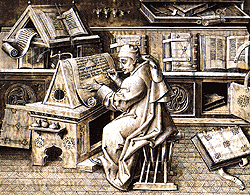






In school work there are undoubtedly obligatory subjects and there are, if it is possible to put it in this way, auxiliary subjects, the study of which is proposed merely as a means of studying the obligatory.
P D. Ouspensky, In Search of the Miraculous
All of us who want to participate in the fourth way have to think about the ideas, just as we all have to work on emotions and the physical. But these essays include non-required thinking, auxiliary approaches, in the sense that some of them offer tools for those with a particular facility for such tools, but for those not interested in it, not attracted to it, some other auxiliary approaches are more useful.
Why think about these ideas? Why not just do them?
The point is, we do nothing. We think, we feel, we act. These are our tools, and each has its place. And in each of us, one of these three has the predominant place. It is right, natural and preferred by us. And it is our strength.
We do not use a telescope to examine the content of a cell, nor do we use a microscope to examine the stars. We would smile indulgently (after some period of alarm) if those devices would say "Looking into small things is best" or, "Looking into great distances is best." Each has its own best use, but the technology of each has profited by that learned with the other. Optical refinements, new technologies to correct distortion, photograph analysis etc., learned in one are soon applied to the other, to the extent that they translate well. In short, their progress is in each other's interest.
We, of course, are more complex mechanisms, with many more possibilities. A very large part of realizing those possibilities is finding out just what kind of mechanism we are, what our strengths and weaknesses are. "Know thyself" becomes a way of saying "know your instrument."
The purpose of the right development of functions is to make them more receptive to consciousness. A balanced, harmonious machine is one that performs its function best. Whether this function is the expression of ideas, emotions, or actions depends on the individual. In the fourth way, we see that school, which requires all types and all centers of gravity, nonetheless has the flavor of its teacher's type and center of gravity. It may even be viewed as a higher development of the teacher's essence, one that is naturally based on it.
"G. himself said that there are no "general" schools, that each 'guru' or leader of a school works at his own specialty, one is a sculptor, another is a musician, a third is still something else, and that all the students of such a guru have to study his specialty."
P D. Ouspensky, In Search of the Miraculous
There is room in the fourth way for every true expression and conscious development of essence, and the possibilities are limitless.
The purpose of the fourth way, for you, is the consciousness of your Self. That that consciousness is attained by working with others in many different ways to aid in their conscious development is wonderful and practical.
Rodney Collin once remarked how often people took the fourth way as merely some way to make adjustments here and there to their psychology, and forgot that it was meant to lead to the miraculous. That is the role of thought on the fourth way—to lead to the miraculous.

When I heard the learn'd astronomer;
When the proofs, the figures, were ranged in columns before me;
When I was shown the charts and the diagrams, to add, divide, and measure them;
When I, sitting, heard the astronomer, where he lectured with much applause in the lecture-room,
How soon, unaccountable, I became tired and sick;
Till rising and gliding out, I wander'd off by myself,
In the mystical moist night-air, and from time to time,
Look'd up in perfect silence at the stars.
Walt Whitman

All pages © Copyright John Raithel